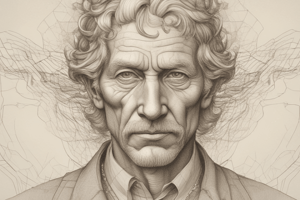Podcast
Questions and Answers
Which stage of Erikson's psychosocial development focuses on the challenge of generativity versus stagnation?
Which stage of Erikson's psychosocial development focuses on the challenge of generativity versus stagnation?
- 21 to 39 years
- 5 to 13 years
- 65 years and older
- 40 to 65 years (correct)
What virtue is associated with the psychosocial stage of identity versus confusion?
What virtue is associated with the psychosocial stage of identity versus confusion?
- Fidelity (correct)
- Wisdom
- Purpose
- Care
At what age range does the stage of trust versus mistrust occur in Erikson's model?
At what age range does the stage of trust versus mistrust occur in Erikson's model?
- Infant to 18 months (correct)
- 18 months to 3 years
- 3 to 5 years
- 5 to 13 years
Which stage is characterized by the conflict of intimacy versus isolation?
Which stage is characterized by the conflict of intimacy versus isolation?
During which stage of psychosocial development is the virtue of competence developed?
During which stage of psychosocial development is the virtue of competence developed?
What is the primary psychosocial crisis faced during the stage of Integrity vs. Despair?
What is the primary psychosocial crisis faced during the stage of Integrity vs. Despair?
Which outcome is likely for individuals who successfully resolve the Generativity vs. Stagnation stage?
Which outcome is likely for individuals who successfully resolve the Generativity vs. Stagnation stage?
What is primarily experienced by those who fail to achieve intimacy during young adulthood?
What is primarily experienced by those who fail to achieve intimacy during young adulthood?
In which stage do individuals primarily confront the challenge of transitioning from childhood to adulthood?
In which stage do individuals primarily confront the challenge of transitioning from childhood to adulthood?
Which of the following describes the feelings associated with unresolved crises during the Integrity vs. Despair stage?
Which of the following describes the feelings associated with unresolved crises during the Integrity vs. Despair stage?
What can lead to a sense of stagnation during middle adulthood?
What can lead to a sense of stagnation during middle adulthood?
During which period do individuals typically focus on the establishment of intimate relationships?
During which period do individuals typically focus on the establishment of intimate relationships?
What is an outcome associated with successful resolution of the Intimacy vs. Isolation stage?
What is an outcome associated with successful resolution of the Intimacy vs. Isolation stage?
What does the sense of integrity in late adulthood stem from?
What does the sense of integrity in late adulthood stem from?
Which conflict is central to the Generativity vs. Stagnation stage?
Which conflict is central to the Generativity vs. Stagnation stage?
What occurs as a result of successful exploration during an identity crisis?
What occurs as a result of successful exploration during an identity crisis?
Which of the following outcomes is a result of unresolved psychosocial crises?
Which of the following outcomes is a result of unresolved psychosocial crises?
What characterizes the psychosocial crisis an individual faces during development?
What characterizes the psychosocial crisis an individual faces during development?
What might result from a failure to resolve the identity crisis effectively?
What might result from a failure to resolve the identity crisis effectively?
In which scenario might a person experience fragmentation of identity?
In which scenario might a person experience fragmentation of identity?
Which term encapsulates both psychological and social conflicts faced during developmental stages?
Which term encapsulates both psychological and social conflicts faced during developmental stages?
What can successful resolution of a psychosocial crisis lead to?
What can successful resolution of a psychosocial crisis lead to?
Which factor is NOT associated with an identity crisis?
Which factor is NOT associated with an identity crisis?
Which of the following can indicate successful exploration during an identity crisis?
Which of the following can indicate successful exploration during an identity crisis?
What is likely to happen when an individual faces unresolved psychosocial crises?
What is likely to happen when an individual faces unresolved psychosocial crises?
Flashcards
Trust vs. Mistrust
Trust vs. Mistrust
This stage, from infancy to 18 months, focuses on developing trust in caregivers. A baby learns to rely on others for basic needs like food and comfort. If these needs are met consistently, the baby develops a sense of trust in the world. If not, they may develop mistrust.
Autonomy vs. Shame/Doubt
Autonomy vs. Shame/Doubt
This stage, from 18 months to three years, is about a child gaining independence and developing a sense of self. They learn to do things on their own like walking, talking, and dressing. If encouraged and supported, they develop a sense of autonomy. If over-controlled or criticized, they may feel shame and doubt their abilities.
Initiative vs. Guilt
Initiative vs. Guilt
This stage, from three to five years, is about a child exploring their environment and taking initiative. They start playing pretend, making decisions, and engaging in imaginative activities. If encouraged, they develop a sense of purpose. If discouraged or punished for their initiative, they may develop guilt.
Industry vs. Inferiority
Industry vs. Inferiority
Signup and view all the flashcards
Identity vs. Role Confusion
Identity vs. Role Confusion
Signup and view all the flashcards
Integrity vs. Despair
Integrity vs. Despair
Signup and view all the flashcards
Generativity vs. Stagnation
Generativity vs. Stagnation
Signup and view all the flashcards
Intimacy vs. Isolation
Intimacy vs. Isolation
Signup and view all the flashcards
Identity Crisis
Identity Crisis
Signup and view all the flashcards
Strong Sense of Self
Strong Sense of Self
Signup and view all the flashcards
Role Confusion
Role Confusion
Signup and view all the flashcards
Psychosocial Crisis
Psychosocial Crisis
Signup and view all the flashcards
Psychosocial Strengths
Psychosocial Strengths
Signup and view all the flashcards
Personality Patterns
Personality Patterns
Signup and view all the flashcards
Exploration
Exploration
Signup and view all the flashcards
Commitment
Commitment
Signup and view all the flashcards
Fragmentation
Fragmentation
Signup and view all the flashcards
Identity Formation
Identity Formation
Signup and view all the flashcards
Study Notes
Erikson's Psychosocial Development Stages
- 65 years and older: Integrity versus despair. Virtue: Wisdom.
- 40 to 65 years: Generativity versus stagnation. Virtue: Care.
- 21 to 39 years: Intimacy versus isolation. Virtue: Love.
- 13 to 21 years: Identity versus confusion. Virtue: Fidelity.
- 5 to 13 years: Industry versus inferiority. Virtue: Competency.
- 3 to 5 years: Initiative versus guilt. Virtue: Purpose.
- 18 months to 3 years: Autonomy versus shame/doubt. Virtue: Will.
- Infant to 18 months: Trust versus mistrust. Virtue: Hope.
Studying That Suits You
Use AI to generate personalized quizzes and flashcards to suit your learning preferences.
Related Documents
Description
Explore the eight stages of Erik Erikson's psychosocial development. Learn about the challenges individuals face at each stage, from trust vs. mistrust in infancy to integrity vs. despair in old age. This quiz will enhance your understanding of human growth and psychological development.




